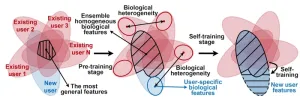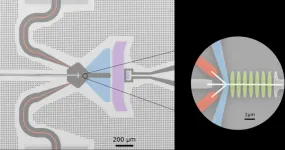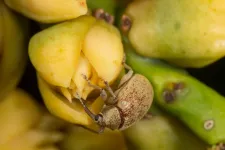(Press-News.org) Researchers from the Quadram Institute and University of East Anglia have identified what makes some strains of gut bacteria life-threatening in pre-term babies.
The findings will help identify and track dangerous strains and protect vulnerable neonatal babies.
A major threat to neonatal babies with extremely low birth weight is necrotising enterocolitis (NEC).
Rare in full term babies, this microbial infection exploits vulnerabilities destroying gut tissue leading to severe complications. Two out of five cases are fatal.
One bacterial species that causes especially sudden and severe disease is Clostridium perfringens. These are common in the environment and non-disease-causing strains live in healthy human guts.
So what makes certain strains so dangerous in preterm babies?
Prof Lindsay Hall and Dr Raymond Kiu from the Quadram Institute and UEA led the first major study on C. perfringens genomes from preterm babies, including some babies with necrotising enterocolitis.
The research team analysed C. perfringens genomes from the faecal samples of 70 babies admitted to five UK Neonatal Intensive Care Units (NICUs).
Based on genomic similarities, they found one set had a lower capacity to cause disease. This allowed a comparison with the more virulent strains.
The less virulent group lacked genes responsible for production of a toxin called PFO and other factors needed for colonisation and survival.
This study has begun to construct genomic signatures for C. perfringens associated with healthy preterm babies and those with necrotising enterocolitis.
Prof Lindsay Hall, from UEA’s Norwich Medical School and the Quadram Institute, said: “Exploring genomic signatures from hundreds of Clostridium perfringens genomes has allowed us potentially to discriminate between ‘good’ bacterial strains that live harmlessly in the preterm gut, and ‘bad’ ones associated with the devastating and deadly disease necrotising enterocolitis.
“We hope the findings will help with ‘tracking’ deadly C. perfringens strains in a very vulnerable group of patients – preterm babies.”
Larger studies, across more sites and with more samples may be needed but this research could help identify better ways to control necrotising enterocolitis.
The team previously worked alongside Prof Paul Clarke and clinical colleagues at the Norfolk and Norwich University Hospital NICU. And they demonstrated the benefits of providing neonatal babies with probiotic supplements.
The enterocolitis gut microbiome of neonatal infants is significantly disrupted, making it susceptible to C. perfringens overgrowth.
Prof Hall said: “Our genomic study gives us more data that we can use in the fight against bacteria that cause disease in babies – where we are harnessing the benefits of another microbial resident, Bifidobacterium, to provide at-risk babies with the best possible start in life.”
Dr Raymond Kiu, from the Quadram Institute, said: “Importantly, this study highlights Whole Genome Sequencing as a powerful tool for identifying new bacterial lineages and determining bacterial virulence factors at strain level which enables us to better understand disease.”
This research was supported by the Biotechnology and Biological Sciences Research Council, part of UKRI, and the Wellcome Trust.
The study was led by researchers at Quadram Institute and the University of East Anglia, in collaboration with colleagues at Imperial College, London, the University of Glasgow, the University of Cambridge, Newcastle University and Northumbria University.
'Particular genomic and virulence traits associated with preterm infant-derived toxigenic Clostridium perfringens strains' is published in Nature Microbiology.
END
Identifying the gut bacteria that threaten neonatal babies
2023-05-25
ELSE PRESS RELEASES FROM THIS DATE:
CityU researchers develop a self-supervised AI adaptation framework to enhance sensing accuracy of EMG devices
2023-05-25
Surface electromyography (EMG) has been widely used to measure the electrical activity of muscles. However, the variability in EMG sensing signals due to biological differences of different users significantly degrades the performance and potential of EMG systems. Recently, researchers from City University of Hong Kong (CityU) developed a deep learning-based framework called EMGSense, which can achieve high sensing performance for new users using AI self-training techniques. This opens a new path for developing more advanced and accurate wearable EMG devices in areas like neurorehabilitation and virtual reality.
This ...
Insilico Medicine receives IND approval for novel AI-designed USP1 inhibitor for cancer
2023-05-25
Insilico Medicine (“Insilico”), a generative artificial intelligence (AI)-driven clinical stage drug discovery company, today announced that the U.S. Food and Drug Administration (FDA) recently approved the initial investigational new drug (IND) application for ISM3091 for the treatment of patients with solid tumors. This is Insilico's first oncology program to advance to the clinical validation stage.
The open-label, multicenter Phase I clinical trial of ISM3091 will be conducted simultaneously in the U.S. and China ...
Quantum scientists accurately measure power levels one trillion times lower than usual
2023-05-25
Scientists in Finland have developed a nanodevice that can measure the absolute power of microwave radiation down to the femtowatt level at ultra-low temperatures – a scale trillion times lower than routinely used in verifiable power measurements. The device has the potential to significantly advance microwave measurements in quantum technology.
Measuring extremely low power
Quantum science takes place mostly at ultra-low temperatures using devices called dilution refrigerators. ...
Enhancing patient care by improving electronic health records: Plan outlines 3 'essential' steps
2023-05-25
An early advocate for the electronic health records now found in hospitals across the country has developed a plan to improve their use, lighten clinicians’ workload and enhance patient care.
The University of Virginia School of Medicine’s Don Detmer, MD, MA, designed the improvement plan in collaboration with Andrew Gettinger, MD, of Dartmouth’s Geisel School of Medicine. Detmer oversaw UVA’s adoption of electronic physician order entry in the early 1990s while vice president ...
Material design by means of defect engineering: German Research Foundation approves new Collaborative Research Center at Mainz University
2023-05-25
When we talk about defects, we generally think of flaws or impairments. However, as far as materials science is concerned, defects represent windows of opportunity. A new Collaborative Research Center (CRC) in the field of soft matter based at and administered by Johannes Gutenberg University Mainz (JGU) will explore these opportunities. The German Research Foundation (DFG) has approved CRC 1552 "Defects and Defect Engineering in Soft Matter" and will be providing funding of some EUR 8 million over the next four years. Also participating are the Max Planck Institute for Polymer Research and the Fraunhofer Institute for Microengineering and Microsystems ...
Scientists propose revolution in complex systems modelling with quantum technologies
2023-05-25
Scientists have made a significant advancement with quantum technologies that could transform complex systems modelling with an accurate and effective approach that requires significantly reduced memory.
Complex systems play a vital role in our daily lives, whether that be predicting traffic patterns, weather forecasts, or understanding financial markets. However, accurately predicting these behaviours and making informed decisions relies on storing and tracking vast information from events in the distant past – a process which presents huge challenges.
Current models using artificial intelligence see their ...
Certain cancers will likely rise exponentially due to COVID-19 screening delays
2023-05-25
Key Takeaways
Current cancer diagnoses compared with pre-pandemic rates: Researchers quantified missed diagnoses of lung, breast, and colorectal cancers by comparing observed cancer rates in 2020 with pre-pandemic cancer rates (2010-2019).
Potential increase in undiagnosed disease: Incidence rates for all three types of cancer have significantly decreased, suggesting that many patients may currently harbor undiagnosed disease.
Importance of screening: Study adds to the growing body of literature on pandemic-related disruptions and serves as a vital reminder to encourage all patients to stay up to date on their recommended cancer screenings.
CHICAGO: ...
UTHealth Houston awarded nearly $13M in grants to study treatments for traumatic brain injury
2023-05-25
Nearly $13 million in federal grant funds to study treatments for traumatic brain injury, which kills an average of 190 people and hospitalizes another 600 in the U.S. every day, has been awarded to UTHealth Houston by the Department of Defense’s Office of Congressionally Directed Medical Research Programs (CDMRP).
The funding marks a positive step forward for patients suffering from the medical condition, said Charles S. Cox Jr., MD, the George and Cynthia Mitchell Distinguished Chair in Neurosciences and the Glassell Family Distinguished Chair in the Department of Pediatric Surgery with McGovern ...
Research team receives grant to launch ‘Just Dis Tech’ project
2023-05-25
A group of Virginia Tech faculty who represent a variety of disciplines is bringing the principles of disability justice to Appalachia through educational workshops, cultural events, and technology research.
The team received a $502,000 grant from the Andrew Mellon Foundation to create local and regional programming for disability-led arts, culture, reflection, and technology guidance. The foundation is a nonprofit organization that funds arts and humanities work nationwide.
With the three-year project, called “Just ...
Weevils, long-nosed beetles, are unsung heroes of pollination
2023-05-25
Butterflies, bees, and even bats are celebrated as pollinators: creatures that travel from flower to flower to feed, and in the process, help fertilize the plants by spreading pollen. But some of nature’s most diverse pollinators often go unnoticed, even by scientists: long-snouted beetles called weevils. A new study in the journal Peer Community in Ecology provides a deep dive into the more than 600 species of weevils, including ones whose entire life cycles are interwoven with a specific plant that they help pollinate.
“Even people who work on pollination don't usually consider weevils as one of the main pollinators, and people who ...







